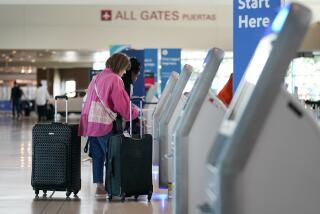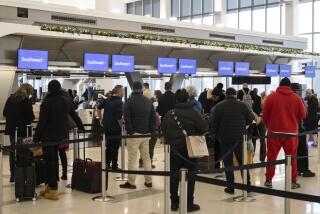Bush May Agree to Federalize Air Security
WASHINGTON — The Bush administration’s misgivings about replacing minimum-wage airport baggage screeners with a federal security force appear to be giving way in the face of strong congressional support for the idea.
And Transportation Department officials are considering dozens of ideas for enhancing security, from strictly limiting the number and size of carry-on bags, to eliminating advance seat selection and even arming pilots.
On Capitol Hill, a proposal by Sen. Kay Bailey Hutchison (R-Texas) would restructure the Federal Aviation Administration’s security division to include luggage screeners and federal air marshals, and create a government career track for aviation security employees.
Administration officials say they now expect that something similar to Hutchison’s proposal will emerge as the final compromise. “There certainly seems to be a growing consensus for that,” said a senior transportation official, cautioning that details are still in flux.
The Sept. 11 attacks that left nearly more than 6,000 people dead or missing have provided the motivation to transform aviation security. Ideas that have been blocked for years now appear to be moving forward. In many cases, passengers would have to give up conveniences they previously took for granted.
“Things that two weeks ago would have been perceived as a significant inconvenience are now being perceived as essential security measures,” said Jane Garvey, head of the Federal Aviation Administration.
Take carry-on bags. Currently there is no single standard in the industry, and individual airlines apply their own polices. For some time, the Assn. of Flight Attendants has proposed that carry-on luggage be sharply limited, essentially to one medium-sized roller bag or two smaller pieces.
Previously, the union had argued its case on safety grounds: An estimated 4,000 people a year get hurt by bags falling from overhead bins. Now the issue is security.
“The bigger the bags, and the more of them there are, the harder it is for screeners to screen,” said union spokesman Jeff Zack.
Likewise, eliminating advance seat selection would make passengers who prefer aisle to window seats unhappy. But it also would make it more difficult for an accomplice of a would-be hijacker to plant weapons aboard a plane in advance.
Some of the most powerful interest groups in aviation have made 180-degree changes in policy since the attacks. The Air Line Pilots Assn. long had argued that reinforced cockpit doors could impede escape or rescue in the event of a crash. The group now has become a leading advocate of a secure cockpit.
And the union has gone even further. Its president, Duane Woerth, has asked Congress to allow pilots to be armed with stun guns. “There are sophisticated stun guns on the market today that are capable of immediately incapacitating a person of any size or strength,” Woerth said. “Use of these guns would be done only in the most extreme circumstances, to protect the lives and safety of the passengers and crew.”
Still, what to do about airport screeners remains the thorniest issue. Transportation Secretary Norman Y. Mineta said last week that having Washington assume responsibility would mean hiring an additional 28,000 government workers at a cost of $1.8 billion a year.
Yet many Republicans and Democrats in Congress appear to think it’s worth it. Some believe that passengers would be willing to pay a security surcharge of $4 to $5 a ticket for better protection. Screening passengers is now the responsibility of airlines, which contract security firms to do the job for the lowest bid. Average turnover among screeners is 126% a year nationwide, although at some of the busiest airports it exceeds 400%.
Separately on Monday, U.S. airports were rechecking identification for all employees with access to secure areas--including flight crews, baggage handlers, catering workers, ramp workers and all screeners.
The purpose of the check, which was ordered last week by the FAA, is to make sure that all identification badges are valid, current and difficult to counterfeit.
More to Read
Sign up for Essential California
The most important California stories and recommendations in your inbox every morning.
You may occasionally receive promotional content from the Los Angeles Times.










